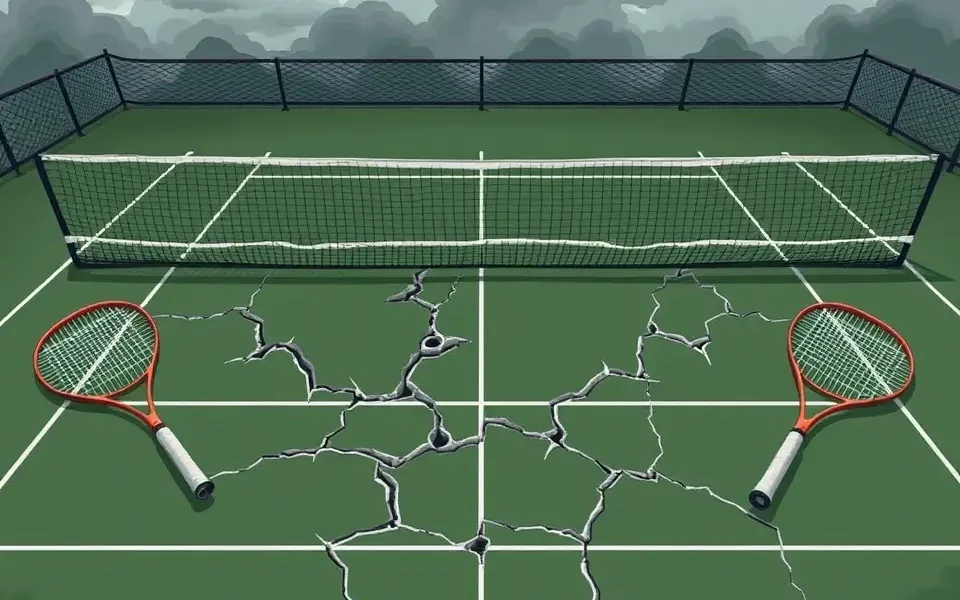A former Wimbledon champion has voiced strong concerns about the Professional Tennis Players Association (PTPA) lawsuit against the ATP, WTA, ITF, and ITIA, arguing it is detrimental to the sport. The PTPA, co-founded by Novak Djokovic, has filed a lawsuit alleging anti-competitive practices and systemic abuse by the governing bodies of tennis. However, not all players are in agreement with this approach, sparking debate and division within the tennis community.
Stich Slams PTPA Lawsuit
Michael Stich, the 1991 Wimbledon champion and former world number two, believes the PTPA’s legal action is “hurting the sport.” Stich’s criticism highlights the growing unease among some within the tennis world regarding the PTPA’s tactics and their potential impact on the game’s overall health.
The PTPA lawsuit, which includes 2022 Wimbledon runner-up Nick Kyrgios and 2014 Wimbledon doubles champion Vasek Pospisil as plaintiffs, accuses the ATP, WTA, ITF, and ITIA of anti-competitive business practices, monopolizing professional tennis, and systemic abuse.
Concerns Over Player Demands
Stich expressed concerns about the demands of top players, suggesting they are “not reasonable” and create problems for tournaments. He emphasized the importance of recognizing the role of promoters, who “give them jobs and are a valuable partner on tour.” Stich’s comments underscore a potential divide between top-tier players seeking greater financial guarantees and the broader interests of the sport, including the viability of tournaments.
The Need for Collaboration
Stich lamented the lack of discussion between players and tournaments during his time on the tour, emphasizing the importance of collaboration and understanding. He argued that players need to understand that promoters are valuable partners and that “the PTPA is hurting the sport with their move and it makes me very sad.”
Inside the PTPA Lawsuit
The PTPA, co-founded by Novak Djokovic and Vasek Pospisil in 2020, filed a 163-page complaint in the U.S. District Court for the Southern District of New York. The lawsuit lists 12 current and former players as plaintiffs, accusing the governing bodies of keeping earnings artificially low through various means, including suppressing competition and manipulating prize money structures.
Key Grievances
The lawsuit raises several key grievances:
- Prize Money: The PTPA argues that the majors pay an intolerably low percentage of revenues as prize money.
- Tour Calendar: The PTPA describes the tennis calendar as “a joke,” arguing that the season is “sadistically, laughably long” and unsustainable at 45 weeks per year.
- Ranking Systems: The PTPA contends that players can only gain ranking points by competing in ATP and WTA sanctioned events, preventing them from earning alternative income.
- Player Welfare: The lawsuit highlights instances where athletes are made to compete in extreme heat and late at night.
The “Cartel” Accusation
The PTPA lawsuit accuses the ATP, WTA, ITF, and ITIA of operating as a “cartel,” alleging that they have “complete control over the players’ pay and working conditions.” PTPA Executive Director Ahmad Nassar stated, “Tennis is broken. Behind the glamorous veneer that the Defendants promote, players are trapped in an unfair system that exploits their talent, suppresses their earnings, and jeopardizes their health and safety.”
Djokovic’s Role and Stance
While Novak Djokovic co-founded the PTPA and remains a member of its executive committee, he is not among the plaintiffs in the lawsuit. Djokovic explained that he wanted other players to “step up” and that he disagreed with some aspects of the lawsuit.
Avoiding Division
Djokovic stressed his desire to avoid division in the sport, noting that his long-standing efforts to improve player representation and influence go beyond the issue of prize money. He stated that there are “things that I agree with in the lawsuit, and then there are also things that I don’t agree with.”
Strong Language
Djokovic also commented on the strong wording used in the lawsuit, suggesting that the legal team was using specific terminology to achieve the desired effect.
Reactions from Other Players
The PTPA lawsuit has elicited a range of responses from players across the tennis spectrum.
Support
Nick Kyrgios has expressed strong support for the lawsuit, calling it a “special moment” for players’ voices to be heard. Vasek Pospisil echoed this sentiment, stating, “For too long, players have been forced to accept a broken system that ignores our well-being, undervalues our contributions, and leaves us without real representation.”
Distancing
Several high-profile players have distanced themselves from the lawsuit:
- Carlos Alcaraz: Alcaraz stated that he was surprised to learn of the lawsuit and that his name was used in the document without his consent. He also clarified that he does not support the lawsuit.
- Iga Swiatek: Swiatek insisted she didn’t have any prior information about the PTPA lawsuit.
- Coco Gauff: Gauff said she had not looked into the lawsuit in detail.
Neutrality
Aryna Sabalenka stated that she wants to see players getting a bigger share of revenue from tournaments in the future.
Industry Response
The ATP and WTA have issued strong responses to the PTPA lawsuit, denying the allegations and vowing to defend their positions.
ATP
The ATP “strongly reject[ed] the premise of the PTPA’s claims” and stated that the group was guilty of “division and distraction.” The ATP further asserted its commitment to “working in the best interests of the game – towards continued growth, financial stability, and the best possible future for players, tournaments, and fans.”
WTA
The WTA described the lawsuit as “regrettable and misguided” and defended its record of growing women’s tennis.
Potential Implications
The PTPA lawsuit has the potential to significantly reshape the landscape of professional tennis.
Legal Battles
The lawsuit could lead to lengthy and costly legal battles across multiple jurisdictions.
Restructuring
The lawsuit could force a restructuring of the governance and financial models of professional tennis.
Player Empowerment
The lawsuit could empower players to have a greater say in the running of the sport.
Expert Opinions
Tennis insider Jon Wertheim has questioned the exclusion of the four Grand Slams from the PTPA lawsuit, suggesting that they would be more straightforward targets given their financial practices. Boris Becker has also criticized the PTPA’s approach, questioning the authority of its Executive Director and the representativeness of the organization.
Conclusion
The PTPA lawsuit has ignited a fierce debate within the tennis world, exposing deep divisions and raising fundamental questions about the governance and financial structures of the sport. While some players and industry figures support the PTPA’s efforts to advocate for greater player empowerment and a fairer system, others express concerns about the potential negative consequences of the lawsuit, including further division and disruption. As the legal battle unfolds, the future of professional tennis hangs in the balance.








No Comment! Be the first one.